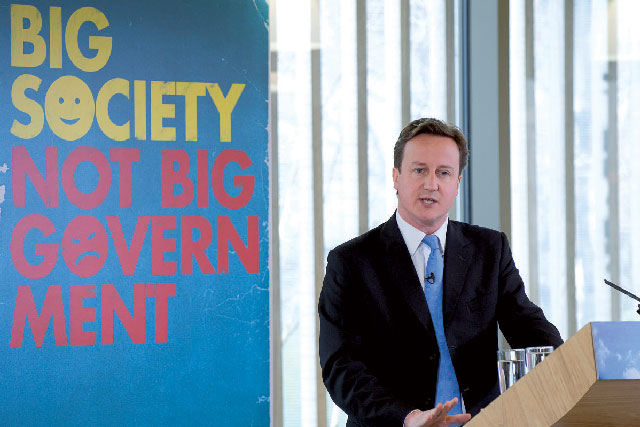
Prime Minister David Cameron's attempt to relaunch his 'Big Society' is timely. The idea - of rolling back the state to empower individuals to take on more civic duties - has taken a series of PR hits recently.
Lord Wei, the government's 'Big Society tsar', admitted scaling back his voluntary work to 'have a life', then suggested councils 'invite' staff to work part time so they could volunteer more.
Earlier this month, Labour-led Liverpool City Council pulled out of a pilot scheme, citing Whitehall spending cuts; similar criticism from Dame Elisabeth Hoodless, outgoing executive director of CSV, Britain's biggest volunteering charity, hurt more.

Cameron hit back last week, announcing the 'Big Society Bank' and a £100m transitional fund for charities among his initiatives. Will this be enough to convince people that 'Big Society' is not just a cover for spending cuts? We asked Richard Huntington, director of strategy at Saatchi & Saatchi, which handles the Labour Party ad account, and Giles Gibbons, chief executive of CSR consultancy Good Business, which he founded with Number 10 strategy director and Big Society architect Steve Hilton.
Diagnosis - Two industry experts on how the Tories can better promote the Big idea
Richard Huntington, director of strategy, Saatchi & Saatchi
Ever since making its debut in the Tories' lacklustre election campaign, Big Society has struggled as an idea. I'm not convinced it is so terrible and I certainly don't buy the attack line that it is masking its master's plan to pull the economy apart. If it was, then it's done a spectacularly bad job of it.
The truth is that the Big Society is just way too clever by half. It's the kind of idea that the most intelligent planner with the thickest glasses and a planet-sized brain would come up with, but everyone in the agency and at the client would politely ignore, because they don't understand it.
And that's the point, isn't it? If no one in Christendom, aside from David Cameron and his strategy director Steve Hilton, can figure it out, it doesn't matter how clever it is, it ain't gonna fly. Forget about the broken society, the Big Society is a broken brand.
Remedy
- Stop believing that one more press conference will convince people. It's like serving up food that a child refuses to eat at every meal, until they give in.
- Make absolutely sure there is something of real interest to Britain in this idea. Cameron: 'The reason I talk about it is not because it's popular, the reason I talk about it is because I care about it.' This says it all: he cares, we don't.
- If there is an idea with merit about personal and collective responsibility, then it needs a 'Janet and John' level of clear explanation that avoids the stench of empty rhetoric and political posturing.
- Finally, the name is a joke and has to go - it is simply not serious enough to be taken seriously, inside or outside politics.
Giles Gibbons, chief executive, Good Business
The Big Society has been taking a battering. The fact that in one survey I read, two-thirds of respondents agreed that it is the government's attempt 'to put a positive spin on the cuts' says it all. David Cameron might keep telling everyone he passionately believes in it, but it can seem like he's the only one.
Part of the problem lies in the way in which the story has been told. It is an unashamedly big idea. It demands a cultural shift, a change in the way we think and behave; and it demands this from the government, businesses, individuals and voluntary organisations alike. It's about everyone doing their bit, because that is the only way to tackle the complex problems we face. No one can address obesity, or climate change alone.
All too often, the government discourse suggests that it is all about volunteers. It has also failed to explain why it wants a Big Society.
The timing is unfortunate - it would have been much easier to launch an idea about adding quality, autonomy and humanity to life in prosperous times. This means that, when it comes to telling the story, the government needs to work much harder.
Remedy
- Stop banging on about volunteers. Start talking about what individuals can do and are doing; about businesses; and the government, too. This has to be about everyone.
- Continually remind people about the breadth of the concept. Put it in the context of the sort of problems we face and how it can make lives better, richer, more rounded.
- Show people that it's already happening. It's not something new and it's not that difficult. Use this to inspire more of it.
Data source:
An online panel of 1500 UK adults across a broad spread of regions and social levels.
Source: Survey took place between 15 and 16 February 2011 by One Poll in association with Marketing.


